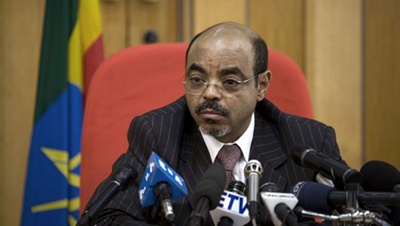This week, in an exclusive interview with the Financial Times, Ethiopian Prime Minister Meles Zenawi suggested that the press in his country freely expresses dissent. In fact, that is hardly the case. The Horn of Africa nation remains one of the world’s worst backsliders of press freedom.
Asked whether a series of recent arrests of political dissidents and legislation on civil society organizations and terrorism had “contributed to an atmosphere where people do not feel free to speak,” the prime minister responded: “Have you read the local newspapers? Do they mince their words about government?”
A multitude of private, political newspapers filled the newsstands in the capital, Addis Ababa–until November 2005. Then, in the midst of deadly unrest following disputed elections, authorities imprisoned the editors of these publications on antistate charges, blaming the violence on their headlines. The government either banned the titles or induced enough fear that printers were dissuaded from printing the newspapers.
When I put the prime minister’s response to Dawit Kebede, who launched the weekly Awramba Times after spending nine months in prison for his critical coverage in 2005, he chuckled softly. “The facts and his argument are totally opposite,” he said, citing self-censorship among the handful of authorized private newspapers venturing into current affairs coverage these days. “Before the 2005 elections, there were a lot of newspapers. Today, we can say there are may be two or three genuinely independent (political) newspapers for a population of 80 million.” Independent in this sense means media outlets not owned by the government or its supporters.
The comments of the prime minister (who, by the way, also told the Financial Times he wants to step down if his supporters will let him) are often out of step with his government’s actions. “I don’t think people have any qualms about criticizing the government or rejecting its policies, or expressing dissenting views in any way,” the business weekly Addis Fortune quoted him as saying in 2007. Yet, since then, the government has threatened, harassed, and imprisoned journalists, blocked the distribution of newspapers and access to Web sites. Speaking to Newsweek in April 2008, Zenawi said the government was enacting “a new press law that we very much hope will put our legislation on par with the best in the world.” Instead, the law was hastily passed with repressive statutes that fall well short of international standards.
In 2007, Zenawi declared that pardons issued to imprisoned journalists and dissidents showed the government had “no sense of revenge.” Its tolerance, though, is limited: The government has denied licenses to three publishers who were among those once imprisoned.
Other independent journalists in Addis Ababa spoke to me on condition of anonymity for fear of government reprisals–a practice that has apparently become the norm for many of their sources. “If you want to interview a university lecturer (on a sensitive issue), one of the first things you hear is, ‘Don’t mention my name. I don’t want to say these things in public,'” according to one veteran reporter. “Always we say ‘person doesn’t want his name to be mentioned.’ It’s a challenge.” Another reporter told me that this practice has led some readers to doubt the credibility of stories in the newspapers. “The government always says they’re trying to be transparent and make a comfortable environment for media. Practically it’s not the case,” the veteran reporter said.
